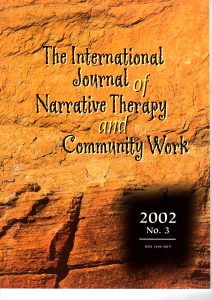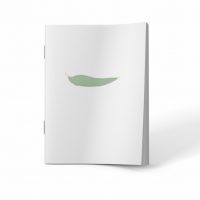2002: Issue 3
 Welcome to this third issue of the International Journal of Narrative Therapy and Community Work.
Welcome to this third issue of the International Journal of Narrative Therapy and Community Work.
Here at Dulwich Centre, in Adelaide, the first signs of Spring are becoming apparent and we’re all pretty pleased about this!
As we approach our summer, conversations are still bubbling here about the international narrative therapy conference that was held in June at Spelman College, Atlanta Georgia. We would like to acknowledge one more time all those who were a part of creating this event. We’d especially like to recognise the generosity of Spelman College and the African-American community of Atlanta for welcoming us all and hosting us in the ways that they did. We’d also like to acknowledge the Colour Guard of the Keetowah Band of the Cherokee who literally drove across the country to welcome us to the land. It was, quite simply, an extraordinary event. Planning is now underway for the next international conference which is to be held in Liverpool UK in July 2003.
After returning from Atlanta we have been busy preparing this issue of the journal. Over the course of this initial subscription year we are determined to provide articles for therapists, community workers, social workers and other health professionals on a diversity of themes and in a range of writing styles. Subscribers will have noticed that the previous two issues have offered practice-based papers alongside easy-toread interviews and reviews.
We’ve been delighted with the warm feedback we have received from readers about the accessibility and practical nature of previous issues and how the papers are proving to be of assistance to practitioners’ work. This is certainly our hope and we appreciate any feedback that can assist us fulfilling it.
We’ve also received letters acknowledging how moving some of the stories within the previous two issues have been. The themes of ‘The Question of Forgiveness’ and ‘AfricanAmerican perspectives: healing past and present’ provided considerable scope for the sharing of stories from different parts of the world.
This particular issue is based back here at Dulwich Centre. The three papers in this journal focus in on the nitty-gritty practice of narrative therapy and the theory that informs it. The first paper, by Sue Mann and Shona Russell describes in detail the use of some of the maps of narrative practice in working with women survivors of childhood sexual abuse. We hope this paper will be of relevance and assistance not only to practitioners who are working in this particular area but to all practitioners who are trying to put the ideas of narrative therapy into practice.
The second paper is entitled ‘Re-membering: responding to commonly asked questions’. It has been created through a collaborative process, co-ordinated by Maggie Carey and Shona Russell, and involving therapists from North America, Australia, Austria and England. This accessible paper, in question and answer format, seeks to provide clarification about re-membering practices. It will be helpful to those new to these ideas as well as those more experienced. It will also, we believe, be a useful teaching tool.
The second half of this issue then consists of a new paper by Michael White entitled ‘Addressing personal failure’. It is a paper that offers thorough explorations of theory and practice. Detailed thinking about modern power, and how this is linked to experiences of personal failure, is accompanied by moving transcripts of therapeutic conversations. A therapeutic map for use with people struggling with a sense of personal failure is offered, as is an exercise to assist practitioners in becoming familiar with using this map. This paper hasn’t been designed for practitioners who are just beginning their explorations of narrative therapy. Instead, it explores new realms of practice and ways of understanding that we believe will intellectually stretch and inspire readers.
Within this issue therefore, we reckon there’s something for everyone – whether you are new to explorations of narrative therapy, or have been working with narrative practices for some time.
On a practical note, you’ll notice that in this issue each paper begins with a formal abstract. Various libraries have been asking us to do this for many years as it makes their task of referencing individual articles much easier. You’ll also notice that once again this edition is over the 72 pages that each issue is supposed to be! We don’t seem to be able to help this … and we don’t suppose you will mind.
We hope your reading of this issue of the journal, which provides explorations of both theory and practice, stretches your thinking, just as producing each issue stretches ours!
